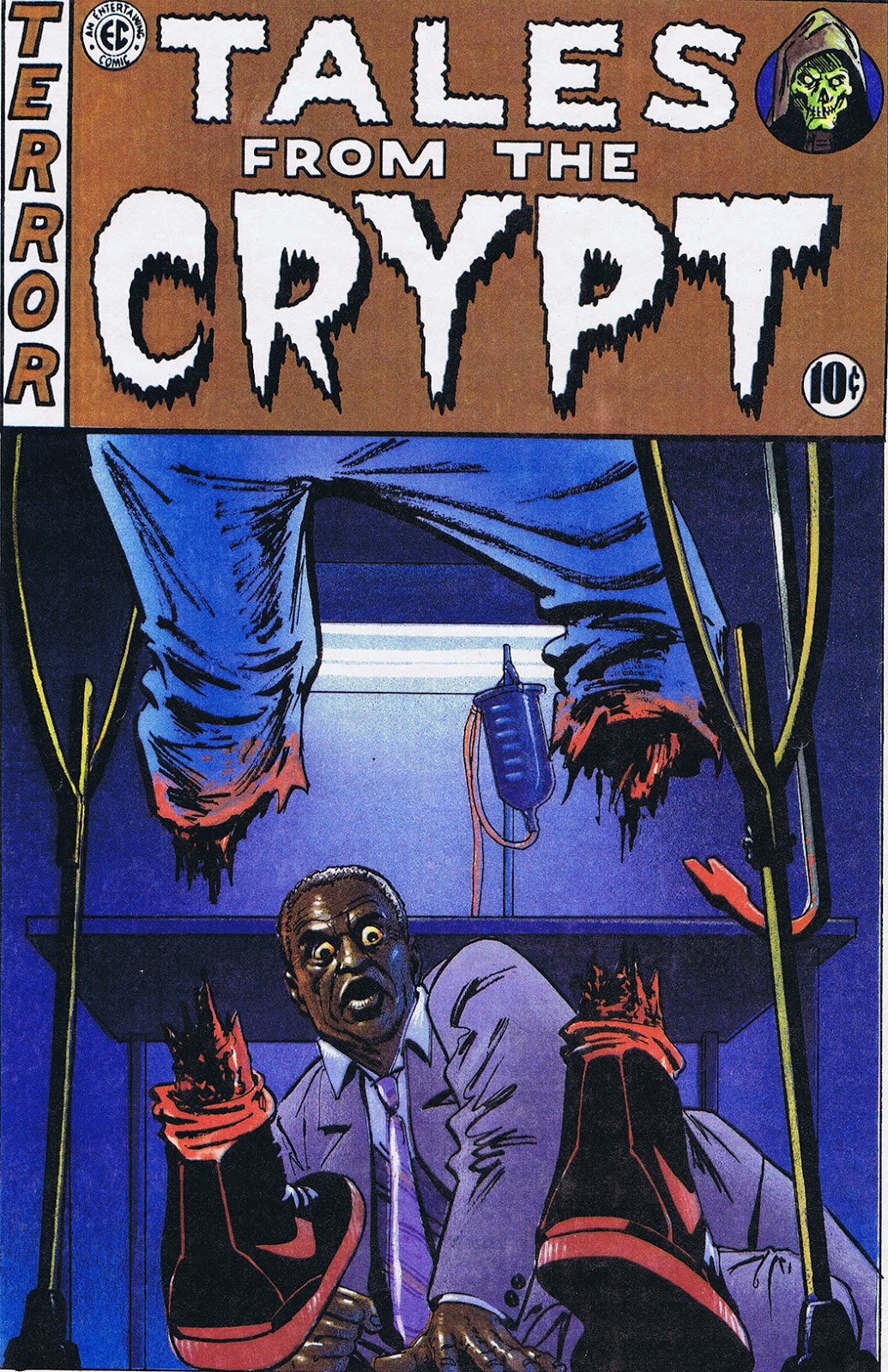Tales from the Crypt, Season 2, Episode 12 "Fitting Punishment"
It’s taken two seasons and eighteen episodes for Tales from the Crypt to release a terror tale with an all-black, or even primarily African-American cast. True, “Til’ Death” from this season has a voodoo theme and black supporting characters but “Fitting Punishment” is the first Tales from the Crypt to occupy an overwhelmingly black cultural space, in this case an inner-city funeral home with wood paneling, an ancient organ player and all manner of sinister, even deadly secrets.
Normally it would qualify as progress for an anthology show like this to prominently feature African-American performers. Considering that Tales from the Crypt is a deeply, almost pathologically nasty and misanthropic enterprise about horrible, evil people who suffer frequently supernatural reckonings for their lust and greed-fueled crimes, however, I doubt that the NAACP was actively campaigning for more African-American representation on a show about awful monsters getting what’s coming to them.
As part of the show’s admirable commitment to equality and equal opportunity nastiness, the African-American villain of “Fitting Punishment” is every bit as greedy, evil, heartless and monstrous as any of the show’s unforgettable white bad guys and girls.
As played by the great character actor Moses Gunn, who proved his acting chops doing things like getting nominated for a Tony for playing Othello on Broadway in 1970 and Booker T. Washington in Milos Forman’s Ragtime, mortician Ezra is a ghoulish hypocrite who is the very picture of Christian piety and righteousness during services or when talking to prospective clients. But as soon as the service is over and church folks are out of earshot, Ezra morphs instantly into a penny-pinching, vicious monster who cares only about making as much money as humanly possible and doesn’t care about who he has to hurt in order to do so. Besides, it’s not like the dead people he works on are going to complain if he helps himself to their valuables.
There’s only room in Ezra’s shriveled, Grinch-like heart for himself so when his lanky, basketball-playing nephew Bobby (Jon Clair) shows up unexpectedly one day explaining that his mother died and that he is now the older man’s responsibility, he is less than pleased.
There’s a wonderful turn where Ezra brightens up considerably once he learns of his sister’s death and grows borderline giddy upon discovering that she perished in a violent, head-on car crash, the kind that can make a lucky mortician a small fortune if he can make a mangled mess of bones and muscles and flesh and carnage look presentable.
Uncle Ezra is awfully cavalier about exposing the dark tricks of his shady trade to his wide-eyed blank of a nephew, from saving money buying flimsily made extra-small coffins from Asia to using plain old water rather than expensive, effective chemicals as an embalming agent to yanking gold teeth out of the uncomplaining, unmoving mouths of the dead.
It seems a little implausible that even someone as sinister as Uncle Ezra would be so candid about revealing his hideousness to someone he just met, but what’s the point of knowing so many sinister life hacks, or, in this case, death hacks, if you’re not going to show them off a little?
“You know, the human body is one big cess pool” Ezra tells his nephew. For him, human beings are nothing more than rotting, decomposing hunks of meat and bone and blood to be abused and used before they’re dropped into a hole for eternity, to decompose and stink and be forgotten.
That includes his nephew, whom he grudgingly agrees to house and “parent” for the sake of having the strapping young man work for him as unpaid labor. The luckless young orphan sleeps on a slab and when the hapless youngster upsets the evil uncle he first paralyzes and then murders him. Then, to really add posthumous insult to fatal injury, he buries his lanky relation in a pine coffin that isn’t big enough for him, necessitating the removal of his feet before his murdered body can be jammed into a bargain-basement corpse container.
It will not come as a surprise, fright fan, to discover that Uncle Ezra ends up paying a ghoulish supernatural price for his evil in life and that the punishment is appropriately fitting, and involves both a revenge-hungry zombie nephew and his nephew’s disembodied feet.
There is no real twist in “Fitting Punishment.” It’s a fastball down the middle instead of a curveball or a knuckleball, an episode that that travels a straight line to an ending preordained by its title.
In that respect “Fitting Punishment” ultimately works much better as a darkly comic character study of a miserable bastard who lives and loots in the gothic intersection of life and death and ends up paying an appropriately terrible price for being such a terrible human being than it does as horror.
Gunn is appropriately theatrical and larger than life, a monster every bit as unforgettable and irredeemable as his caucasian counterparts. Clair is comparatively generic, more a plot point than an actual character. This is Gunn’s show all the way; it’s a tour de force of ice-cold villainy that provides much of the episode’s gritty neo-blaxploitation feel.
“Fitting Punishment” isn’t particularly suspenseful, or scary or surprising, but it works so well as a mood piece, a character study and a vehicle for Gunn’s gloomy charisma that it’s easy to overlook its shortcomings in the fright department and appreciate it on its own ghoulish, funereal, darkly comic terms.
I make my living largely through Patreon so if you would be kind enough to pledge as little as one dollar over at http://patreon.com/nathanrabinshappyplace it’d be






